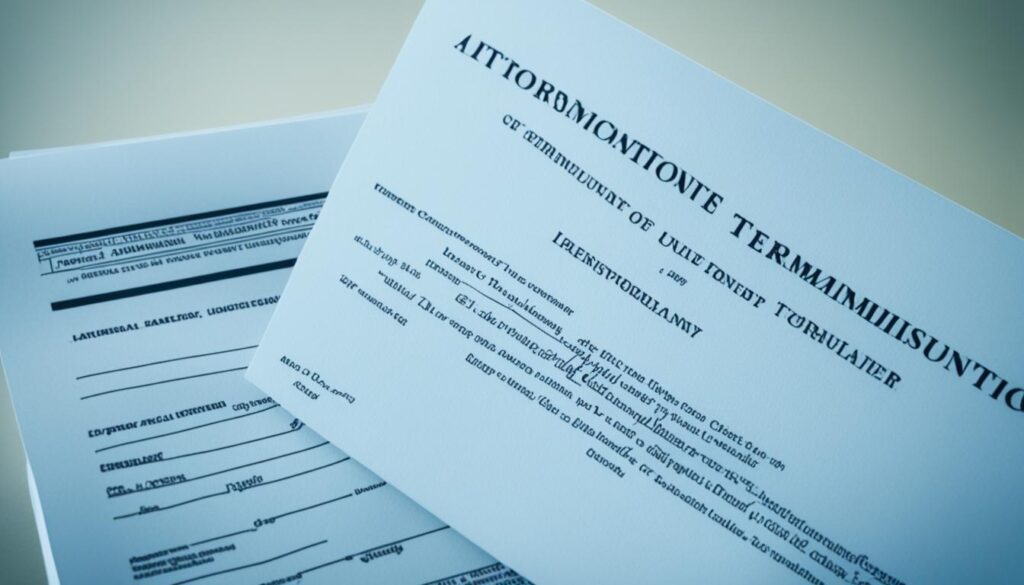Firing your attorney is a big choice. It lets you pick who represents you in court. You can change lawyers if you need to. But, changing too late can be a problem, like when the trial is near or when settling your case. It’s important to know what might happen if you switch lawyers late.
Changing lawyers late can slow down the legal process. This might delay court dates or meetings. And, it can change the plan for your case. It could even affect the final decision. Late changes can also be tough emotionally. They might bring stress and need you to be ready for a change.
Key Takeaways
- Firing an attorney late in the process can lead to delays, increased fees, and disruption of legal strategy
- Emotional and financial consequences are more likely when firing an attorney close to trial or settlement
- Communicating concerns, reviewing the fee agreement, and seeking legal advice are crucial steps before terminating the attorney-client relationship
- Changing attorneys close to the statute of limitations or a significant deadline can put your case at risk
- The best way to avoid the need to fire your attorney is to choose the right legal representation from the start
Understanding Your Legal Rights in Firing an Attorney
As a client, you have the right to pick the best legal help for you. This means you can change attorneys if you need to. It’s important to know your rights when it comes to leaving your current lawyer.
Your Right to Terminate the Relationship
You can end your relationship with your attorney at any time and for any reason. When you do, they should give back your case documents and any fees not used. Make sure you know if there are specific rules about ending the relationship in your agreement.
Reasons for Firing Your Attorney
People might want to fire their attorneys for various reasons. This could include:
- Lack of communication – Many clients are dissatisfied due to poor communication with their lawyer.
- Unprofessional behavior – Some change lawyers because their current one forgets important legal details.
- Inexperience in your case’s area of law – A few clients switch because their attorney doesn’t have enough court experience.
- Disagreements over legal strategy – Sometimes, clients and attorneys don’t see eye-to-eye on how to proceed, leading to a change in legal representation.
No matter the reason, carefully think before firing your attorney. Try to solve any issues with them first.
“You have the freedom to choose your legal representation, and this right extends to firing your current attorney and hiring a new one if necessary.”
In California, you can choose to represent yourself. However, it’s important to remember that self-representation isn’t always the best choice. Understanding the legal complexities of your case is key.
Legitimate Reasons for Discontinuing Your Current Attorney

If your attorney doesn’t keep you in the loop, that’s a problem. It’s frustrating when they don’t share updates or dodge your calls and emails. Unprofessional actions like missing deadlines or showing no interest can make you consider a change.
Switching lawyers might be necessary if they’re not well versed in your type of case. Or if you differ a lot on the legal plan, you could look for someone who gets your strategy better.
“A trial pending can discourage attorney changes, especially when the trial is imminent or ongoing. Multiple attorney switches can raise suspicion in court and potentially hurt a case.”
- Attorneys may put liens on client earnings for work done.
- They can withdraw from a case if needed to avoid conflicts.
- Being caught for theft often leads to lawyers being disbarred.
- Overcharging could drive clients to seek free legal help.
Remember, lawyers must keep your info private and honor the client-lawyer trust. Attorneys causing unnecessary wait times might push you to find someone else too.
In California, lawyers must end the client link for three main reasons. They can walk away if the client asks for weird things, does illegal stuff, or doesn’t pay the bills.
At the end, making the choice to let go of your attorney is a big deal. It’s about how well they work, talk, and if they understand your legal goals. Being aware of your rights and the valid reasons to stop working with a lawyer helps you protect your interests.
Consequences of Firing Your Attorney Late in the Case
Deciding to change your attorney late can be a big deal. It can cause your case to slow down, cost more money, and change your legal plan. These issues might change the case’s end result significantly.
Delays in Proceedings
Getting a new attorney means they’ll have to catch up on your case. They need to understand everything and come up with a new plan. This can slow down what’s already a long and stressful process.
Additional Costs
Hiring a new lawyer close to the end can be expensive. They might ask for money upfront and charge for their time. These extra costs can be more than sticking with your first lawyer the whole way through.
Loss of Continuity
Switching lawyers can make your legal plan less smooth. A new lawyer might see things differently, leading to a change in direction for your case. This change might not be what’s best for you and your situation.
Emotional Toll
Letting go of your lawyer can be tough, especially if you were close. It can make an already stressful situation even harder. The emotional strain of finding a new lawyer can be a lot to handle.
In summary, changing your lawyer late in the game has serious impacts. Think about the delays, extra costs, continuity loss, and emotional strain. It’s best to work through any problems with your lawyer early to avoid all this.
Steps to Take When Firing Your Attorney

Letting go of your attorney might seem hard, but the right steps can make it easier. Start by gathering all your case files, paperwork, and any legal funds. These items are key for your new lawyer to know the full story of your case.
After that, take a close look at your fee agreement or engagement letter with your current attorney. This document will tell you how to end the contract correctly. It keeps you from facing legal trouble later on. Knowing your agreement helps you stop working with your attorney the right way.
Once your previous attorney is out, start looking for a new one. Choose a lawyer who knows the right area of law for your case. Think about their skills and how well they communicate. This is crucial to solving your legal problems effectively.
Key Steps to Take When Firing Your Attorney:
- Gather all your case files, paperwork, and legal funds
- Review your fee agreement or engagement letter to understand termination requirements
- Find a new attorney who specializes in the relevant area of law
- Meet with potential lawyers to evaluate their experience and fit for your case
By sticking to these steps, the jump from old legal help to new one can go smoothly. This leads to a better ending for your case.
“Firing your attorney can be a necessary step, but it’s important to do so in a way that protects your legal rights and interests. Following the proper procedures and finding the right replacement lawyer can make all the difference.”
Letting your attorney go and finding a better one is tricky. But, if you stay ahead and know your stuff, you can avoid problems. This puts your legal issue on a path to success.
How to Pick the Right Replacement Attorney
Firing your current legal counsel requires choosing a new one carefully. This task may seem tough, but a proper approach helps. You want someone skilled in meeting your legal needs and experienced enough to handle your case well.
When looking for a new lawyer, you should focus on a few important things:
- Specialization and Experience: An attorney should specialize in the law field your case falls under. Pick someone with a good history of success and who keeps updated with legal changes.
- Communication and Responsiveness: Good communication with your lawyer is key. Check how well the lawyer communicates from the start and if they promise to keep you in the loop.
- Reputation and Reviews: Learn about the attorney’s standing from both peers and clients. Use online reviews and recommendations to gauge their competence and how well they treat their clients.
- Fees and Billing Practices: Grasp the new attorney’s pricing model and any extra fees. Make sure you’re getting a fair deal by comparing what various lawyers offer.
- Compatibility and Trust: It’s crucial to feel at ease with your new attorney. Make sure you’re comfortable and can trust them to help you with your case.
Considering these aspects will up your chances of finding a fitting replacement lawyer. They can better guide your case toward the results you hope for.
Letting go of your attorney isn’t a light decision, because it affects your case. But, if you have good reasons and have thought it through, it’s key to securing your legal interests by finding a new attorney.
Navigating the Transition Process from Old to New Attorney

Switching from one attorney to another needs careful steps. You should keep the communication open. Give your new attorney all the important case details. Let them lead you through the process. This way, your transition will be smooth.
Notify Your New Attorney and Gather Case Files
To start, tell your new attorney about the switch. Give them all the needed case info. This includes papers, emails, court stuff, and more. Make sure you hand over all files. It lets your new attorney learn about your case. They can plan a good strategy.
Communicate Openly with Your New Counsel
Talking clearly with your new lawyer is key. Share your goals and concerns. Tell them any specific wishes you have. This helps your new attorney know what matters most and work for a great outcome. Be ready to answer their questions and give more info.
Manage the Transition with Your Former Attorney
Working with your former attorney is also important. You might need to pay any remaining fees. Move your money. Get a full case file. Stay professional with your old lawyer. They should help with the switch, as the job’s rules say.
Follow these points to move rightly from your old lawyer to the new one. Stay organized. Talk well. Let your new attorney lead. This makes sure everything goes well. It lets your new attorney support you in the best way.
| Key Steps in Transitioning to a New Attorney | Description |
|---|---|
| Notify the new attorney | Tell them about the change and give all the case info. |
| Gather complete case files | Bring all the papers and emails your new attorney will need. |
| Communicate openly with the new attorney | Share what you want and need with them. This helps a lot. |
| Manage the transition with the former attorney | Sort out money and paperwork with your old lawyer. |
“Transitioning to a new attorney should be a carefully managed process to ensure the continuity of your case and the best possible representation.”
By sticking to these steps and talking openly, you make sure your new attorney can stand up for you well. They can help get the results you’re looking for in your case.
Avoiding Pitfalls When Firing Your Attorney
Firing your attorney needs care. The right steps can avoid problems. When you want to end the relation, stay in touch openly. Keep records and get legal advice for a smooth switch.
Maintain Open Communication
Talk openly when you let your attorney go. Be honest about why you’re not happy. Set clear goals for the change. This will cut down on bad vibes and make things professional.
Document All Interactions
Write down everything between you and your lawyer. Save emails, letters, and call notes. This record can help if you end up in a fight. It’s your safety net.
Seek Legal Advice
Before you fire them, talk to another lawyer. New advice helps you know your rights. They can guide you, avoiding mistakes along the way.
Resolve Fee Disputes Promptly
Make sure all bills are paid before you leave. Handling money matters fast avoids trouble later. It’s key to a clean ending.
Maintain Professionalism
Stay professional while you part ways. Avoid trash-talking your old attorney. Being civil helps you and your case look good.
These steps can guide you well when it’s time to let your attorney go. Always think of attorney firing mistakes to avoid, tips for changing lawyers, and professionalism during attorney transition. Such factors are very important.
“Effective communication and a proactive approach are key when transitioning to a new attorney. Maintaining professionalism and attention to detail can help you avoid common pitfalls.”
By doing the right things and getting advice when you need it, you can change lawyers smoothly. Then, you’re ready to face your legal issues, knowing you’re in good hands.
When Is It Too Late to Fire Your Attorney?

Choosing your own lawyer is a key freedom in the U.S. legal system. You can fire your attorney whenever you like, for any reason, even if you still owe them money. Then, you’re free to hire a new one.
However, firing your lawyer late could be bad for your case. It matters when and why you’re thinking of changing attorneys. Think about it carefully.
Signs It May Be Time to Fire Your Attorney
- Communication breakdown or inability to reach your attorney
- Disagreements with your attorney’s legal strategy or advice
- Unethical behavior or misconduct by your attorney
- Unreasonable or unexpected fees
- Your attorney is disorganized or unprepared
If trying to fix things with your lawyer hasn’t worked, consider finding a new one. Waiting too long might hurt your case’s success.
Potential Consequences of Firing Your Attorney Late in the Case
Firing your attorney late in the game can cause problems. This can mean extra costs and strategy changes. It’s a bad idea to do this when your spouse has a lawyer, until you get a new one, to avoid complications.
Your new lawyer will handle all the paperwork and get your case files. If you take over, remember to file the necessary forms and tell everyone in writing.
Choosing the Right Replacement Attorney
Talking to a new personal injury attorney can help you decide. Look for one who has had success before, is good at talking to people, and is dedicated.
Burger Law, a top personal injury firm in Missouri and Illinois, has a lot of experience and has made over $200 million for its clients. Their Missouri Super Lawyers® and most of their team work on winning your case basis, meaning they get paid only if you do.
Firing your attorney is a big step, but if it’s necessary, don’t wait too long. Choosing the right lawyer at the beginning is the best way to avoid this situation.
The Importance of Choosing the Right Attorney from the Start
Choosing the right attorney early can vastly improve your case’s outcome. It’s crucial to pick a skilled, communicative, and trusted legal advisor. This prevents changing attorneys midway and the issues that may come with it.
Factors to Consider When Hiring a Lawyer
Several important points should guide your selection process:
- Experience: Seek an attorney with a history of success in cases like yours. Their know-how greatly influences your case’s success.
- Communication Skills: Good communication with your lawyer is key. Ensure they respond promptly and explain things clearly and simply.
- Reputation: Look into the lawyer’s standing in the legal world. A respected attorney often delivers top-notch service and wins more for their clients.
Considering these factors boosts your odds of getting the right lawyer from the outset. It decreases the need to switch lawyers later on.
Benefits of Working with an Experienced, Reputable Legal Counsel
Collaborating with a top attorney offers many pluses, such as:
- Getting better results for your case
- Feeling less stressed and anxious during legal proceedings
- Having clear and effective talk with your attorney
- Lowering the risk of setbacks or case complications
- Getting cost-efficient legal support
Spending time upfront to find your ideal attorney is worthwhile. It can save you a lot of trouble, money, and personal worry later. Focusing on the importance of an expert, communicative, and reputable legal advisor ensures your legal matters are treated properly and with skill.
Impact of Firing Your Attorney on Your Case

Let’s look at what happens when you decide to fire your attorney. It can change your case’s direction and results a lot. Knowing the possible effects of this choice is key to making a smooth change and keeping your case on track.
Firing your lawyer might slow things down. A new lawyer needs time to catch up on your case. This slowing down could be bad news for certain cases, like ones dealing with personal injuries or family issues, where time matters a lot.
There’s also the money side of things to consider. Getting a new lawyer can get pricey. You might have to pay a new fee and more hours of work as your new lawyer learns your case. This cost can be a big deal if you’ve already been working together for a while. Your first lawyer might also try to get paid for the work they did before leaving.
| Potential Impact | Explanation |
|---|---|
| Delays in Legal Proceedings | Changing attorneys can lead to disruptions in the case timeline as the new lawyer familiarizes themselves with the details. |
| Additional Costs | Hiring a new attorney may require a new retainer fee and increased billing hours as the new lawyer gets up to speed. |
| Disruption in Legal Strategy | Late attorney changes may necessitate a change in the legal approach, potentially impacting the case’s outcome. |
| Emotional Toll | Transitioning to a new attorney can be stressful, especially if there was a good relationship with the previous lawyer. |
Changing lawyers can also disrupt your case’s strategy. If you fire your lawyer late in the game, the whole plan might need to change. The new lawyer might have to start fresh, which could take a lot of time and effort.
Don’t forget the emotional impact of moving on to a new attorney. It can be tough, especially if you and your old lawyer worked well together. This extra stress can make dealing with your legal matter even harder, which can affect how well you make decisions.
To wrap up, firing your attorney can have a big impact. It could cause delays, more costs, strategy changes, and emotional stress. Think it over and talk to your new lawyer before you do anything. Staying open, organized, and professional as you make the change can help a lot.
Conclusion
Firing an attorney is tricky and needs careful thought. This guide has dug into important parts of making this choice. We talked about your rights, when it’s okay to stop working with a lawyer, timing’s effects, and how to switch.
You can let go of your lawyer whenever you want. But how and when you do it really matters for your case. It’s important to think hard, get legal advice, and smoothly move to a new lawyer. This new lawyer should be ready to pick up where the old one left off.
The real aim is to find a good lawyer who meets your needs. Focus on talking openly, doing your homework, and being ready to act. By doing these things, letting go of a lawyer can lead to a better situation for your legal matters.
